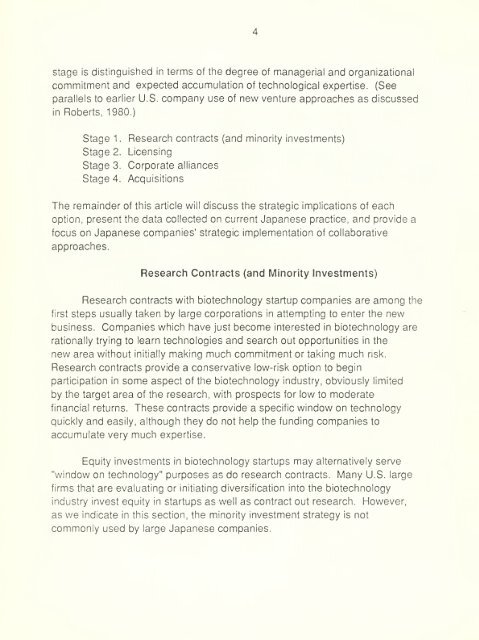Inter-firm technological collaboration : the case of Japanese ...
Inter-firm technological collaboration : the case of Japanese ...
Inter-firm technological collaboration : the case of Japanese ...
Create successful ePaper yourself
Turn your PDF publications into a flip-book with our unique Google optimized e-Paper software.
stage is distinguished in terms <strong>of</strong> <strong>the</strong> degree <strong>of</strong> managerial and organizational<br />
commitment and expected accumulation <strong>of</strong> <strong>technological</strong> expertise. (See<br />
parallels to earlier U.S. company use <strong>of</strong> new venture approaches as discussed<br />
in Roberts, 1980.)<br />
Stage 1<br />
.<br />
Stage 2. Licensing<br />
Research contracts (and minority investments)<br />
Stage 3. Corporate alliances<br />
Stage 4. Acquisitions<br />
The remainder <strong>of</strong> this article will discuss <strong>the</strong> strategic implications <strong>of</strong> each<br />
option, present <strong>the</strong> data collected on current <strong>Japanese</strong> practice, and provide a<br />
focus on <strong>Japanese</strong> companies' strategic implementation <strong>of</strong> collaborative<br />
approaches.<br />
Research Contracts (and Minority Investments)<br />
Research contracts with biotechnology startup companies are among <strong>the</strong><br />
first steps usually taken by large corporations in attempting to enter <strong>the</strong> new<br />
business. Companies which have just become interested in biotechnology are<br />
rationally trying to learn technologies and search out opportunities in <strong>the</strong><br />
new area without initially making much commitment or taking much risk.<br />
Research contracts provide a conservative low-risk option to begin<br />
participation in some aspect <strong>of</strong> <strong>the</strong> biotechnology industry, obviously limited<br />
by <strong>the</strong> target area <strong>of</strong> <strong>the</strong> research, with prospects for low to moderate<br />
financial returns. These contracts provide a specific window on technology<br />
quickly and easily, although <strong>the</strong>y do not help <strong>the</strong> funding companies to<br />
accumulate very much expertise.<br />
Equity investments in biotechnology startups may alternatively serve<br />
"window on technology" purposes as do research contracts. Many U.S. large<br />
<strong>firm</strong>s that are evaluating or initiating diversification into <strong>the</strong> biotechnology<br />
industry invest equity in startups as well as contract out research. However,<br />
as we indicate in this section, <strong>the</strong> minority investment strategy is not<br />
commonly used by large <strong>Japanese</strong> companies.



